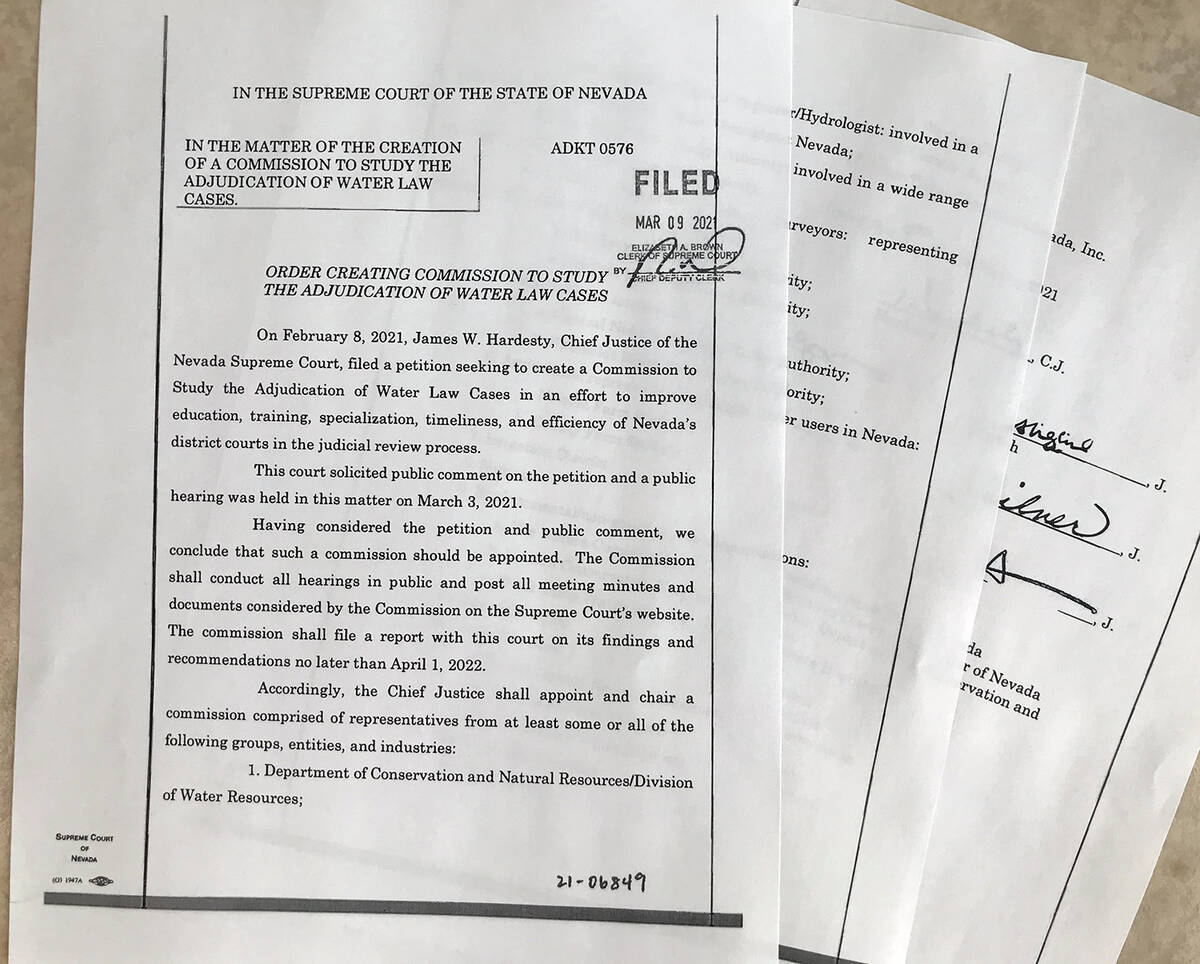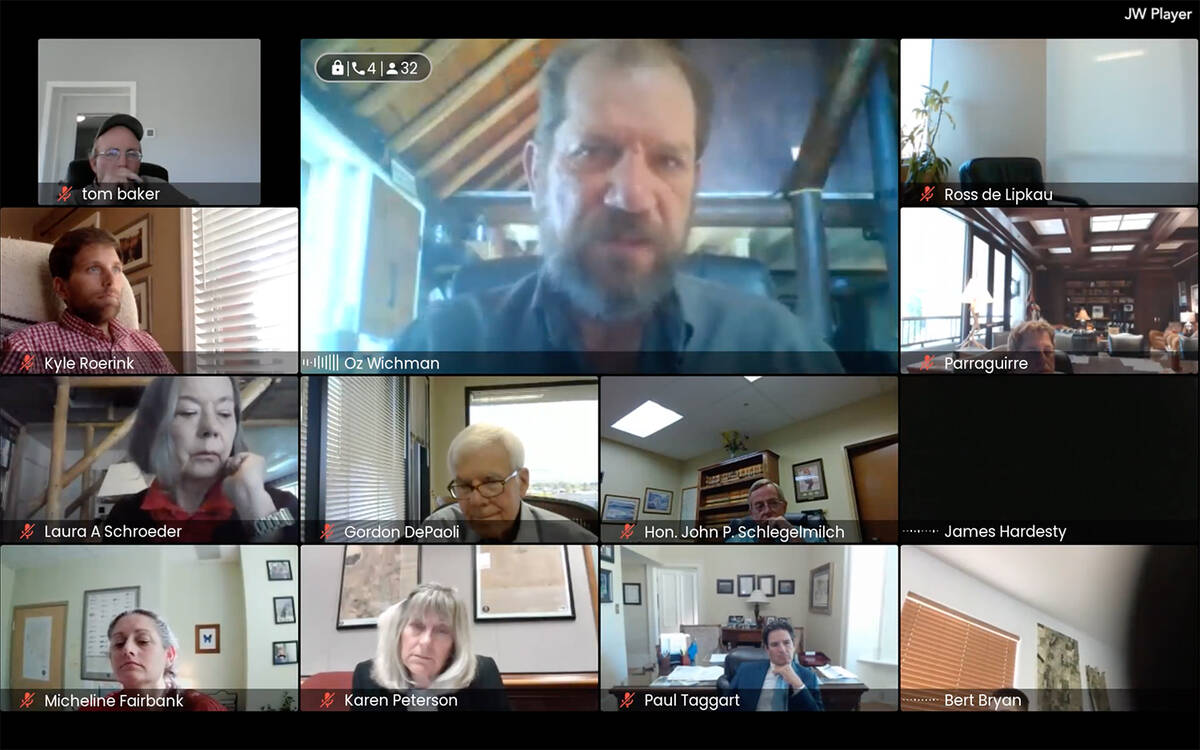Nevada ‘water court’ concept under consideration
In the driest state in the nation, “Whiskey is for drinking, water is for fighting,” isn’t just a catchy saying, it’s reality.
All throughout the state of Nevada, water resources are a topic of unrelenting contention and the tug of war between domestic users and commercial operations, both of which cannot survive and thrive without water, is ongoing. Throw in environmental advocates and the situations becomes even more tempestuous. Lawsuits are common but water law is extraordinarily complex, leading to a variety of challenges for the state’s district courts, where those lawsuits originate. On top of this, the decisions of the lower courts are sometimes conflicting and final rulings on appeals from the Nevada Supreme Court often take years to come to fruition, as was the case with the lawsuit surrounding Nevada State Engineer Order #1293A.
It is the very specialized nature of water law cases and their lengthy, complicated legal battles that prompted the Nevada Supreme Court to establish a Commission to Study the Adjudication of Water Law Cases earlier this year and one of the proposals coming out of that commission, that of a “water court”, is already capturing the attention of many throughout the state.
“The Nevada Supreme Court convened the Commission to Study the Adjudication of Water Law Cases on March 9, 2021,” information about that body explains. “Under the chairmanship of (Nevada Supreme Court) Chief Justice James Hardesty, the commission will work to improve education, training, specialization, timeliness and efficiency of Nevada’s district courts in water law cases. Commission membership is comprised of experienced professionals, key stakeholders and members of the Nevada judiciary.”
The commission to study water adjudication met for the first time on April 16 of this year and during that meeting one of the agenda items was to introduce the concept of a new water court. If created, this body would be tasked with overseeing all water law cases in the state.
As is to be expected, this concept is yet another wedge between the opposing sides of the water issue, with some in favor of and others against the idea. There are those who feel a water court presents a viable solution that would streamline the adjudication process and ensure equitable application of the law, but others are expressing their concerns about the potential makeup of that court and skepticism as to whether it would be a truly independent body free from external influences.
When the concept of a water court was broached at the commission to study water adjudication’s first meeting, then Nye County Water District Manager Oz Wichman, who is one of 26 people appointed to the commission, put forward a few suggestions on the parameters of the water court. He was then asked to delineate his comments in a memorandum, which gives an overview of what he felt such a court should look like, were it to in fact be established.
Under Wichman’s recommendations, the water court would be comprised of a total of five members who would be appointed to lifetime terms, rather than elected by the voters of the Silver State, and this lack of voters’ say in selecting the judges is one of the major sticking points for those who oppose the move.
For his part, Wichman has some straightforward reasoning behind his suggestions, which are encapsulated in the memorandum and accessible to the public through the Nevada judiciary’s website. Entitled “Water Court and Water Districts Proposal,” the document outlines Wichman’s thought process in terms of the formation of a water court.
“The court should consist of five judges assigned to five distinct districts. The judges are to reside (live in) their assigned districts. Hearings (litigation) are to be conducted within the district boundary,” the document reads in regard to the proposed number of judges and creation of water court districts. “There is a common thread of concern that should a water court be created and (for example) all judges reside and hear cases in a centralized location, rural Nevada will have no representation… This provides for equitable representation for both metropolitan and rural areas.”
As to why he recommends that these judges be appointed for life by the Nevada Supreme Court, Wichman explains, “The goal is to provide judges with extensive knowledge of water law that will remain in office for extended periods (decades),” while also noting that the water court would have the power to petition the Nevada Supreme Court for removal of one of its judges in the event that the body feels that person is not performing their duties correctly.
Another point made by Wichman is that the water court’s decisions should not be the end-all, with any rulings from that body subject to appeal to the Nevada Supreme Court. He also recommends that decisions of the water court be made as a whole, noting, “The judge assigned to the district will provide the burden of research and preside over the proceedings. However, all decisions will be considered, and voted on, by the full body and as such will require at least three judges to be in agreement with any given decision coming out of the court.”
Whether a water court will be established and if so, precisely how that body will be structured, is still up in the air however, with the Commission to Study the Adjudication of Water Law Cases set to continue meeting until spring of next year. The commission is expected to present its findings and recommendations to the Nevada Supreme Court no later than April 1, 2022.
This body’s meetings are available for telephonic or online participation, as well as live-streaming, on the platform Lifesize. Details on joining the meetings can be found with each agenda, which will be posted online at least three days prior to the meeting. The Pahrump Valley Times reached out to the commission to learn when its next meeting would be held but no date for that meeting has been set yet. Once it is, the notice of the meeting will be posted online on the Nevada Supreme Court’s calendar.
Meeting documents and recordings, a full list of the 26 members and other information regarding the Commission to Study the Adjudication of Water Law Cases can be found online at www.nv.courts.gov by clicking on the “Nevada Appellate Courts” link at the top of the page, followed by “Programs and Services”.
For more information contact Micheline Fairbank at mfairbank@water.nv.gov or Jamie Gradick at jgradick@nvcourt.nv.gov
Contact reporter Robin Hebrock at rhebrock@pvtimes.com


















